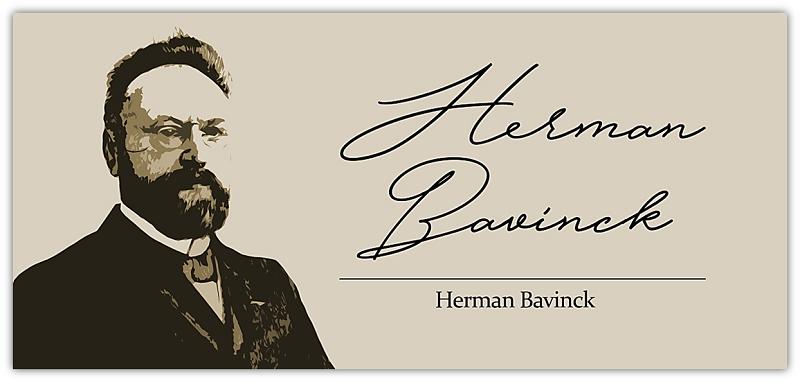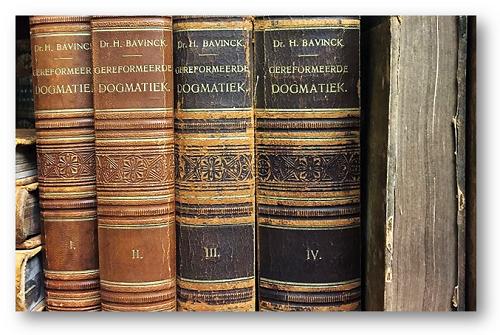Staying Reformed with Bavinck
Staying Reformed with Bavinck

It is busy in Kampen this year. It was 150 years ago that the theological school was founded. This is being remembered in all sorts of ways. But in 1854 another important event took place: on December 13th, Herman Bavinck was born. Bavinck would grow up to be one of the most influential teachers in Kampen. This anniversary is also being celebrated from the 28th to the 30th October, with a congress in Amsterdam (where Bavinck also worked) and in Kampen.
What does Bavinck mean today? In any case he is still of great scholarly significance. His Reformed Dogmatics (Gereformeerde Dogmatiek) is a standard work, a must for reformed theologians. Especially of late, it has aroused renewed attention. Bavinck has even been translated into Italian. Alongside Calvin’s Institutio Christianae Religionis, his four-volume work is the handbook of reformed doctrine.
Yet it is another side of Bavinck that I want to bring to the forefront here. It is my conviction, that even today, Bavinck can be of great spiritual and ecclesiastical significance. From Bavinck you can learn what it is to remain reformed, in a time in which this is anything but automatic.
I am writing this article in the week that eight ministers of the Gereformeerde Kerken (vrijgemaakt) have published a manifesto. Herein, they express their concern about a number of developments within their churches. They call for us to stay reformed.
Courage⤒🔗
My question is: what can we learn from Bavinck about staying Reformed? One thing is sure in any case: he was never ashamed of his reformed conviction. On the contrary! After a year in Kampen, Bavinck studied theology in Leiden. In that time, Leiden was a stronghold for theological modernism and liberalism. He completed a lustrous study there and obtained his theological doctorate cum laude after six years. But hear one of the propositions in his thesis: ‘Tested against the Reformed principle the Secession of 1834 was legitimate and dutiful (articles 28 & 29 Belgic Confession of Faith)’. Leiden was not for the faint hearted!
If you read Bavinck’s dogmatics, every page testifies to just how much he wanted to hold on to the reformed convictions. Right at the start in the foreword he says: ‘in no other confession has justice been done to what is Christian, as in the confession of the Reformed churches’. This deep conviction confers great power and unity to Bavinck’s dogmatics. It is not the brilliant thoughts of a great scholar which swing first to the right, then to the left. He wants to follow the fixed course of the reformed confession. As reformed people, one century later, we may be deeply grateful for that. Bavinck shows us how significant our confession can be for us when we reconsider reformed doctrine.
At any rate you can learn this from Bavinck: do not be ashamed of the Reformed Confession. Stand up for it with courage, hold on to it, be eager to learn from it. Staying Reformed — that was also his desire.

New in Old←⤒🔗
Nevertheless, I have to say more about this. For Bavinck it was all about thinking through Reformed doctrine anew. If there was something he did not want, that was only to repeat the answers of the generations before. It is a typical characteristic of Bavinck’s work that he is so progressive. To be honest, I see this as one of the finest things that you can learn from him: being Reformed, holding on to the confession, does not mean conservatism but it helps you to face your own time and move forward. Bavinck writes in the foreword of his dogmatics:
Praising old things only because they are old is neither Reformed nor Christian. Dogmatics not only describes what has been valid, but what must be valid. It has her roots in the past but works towards the future. For this reason this work of dogmatics wants to bear the stamp of its own time.
Bavinck made these words come true. He broke with all sorts of old dilemmas and pointed new directions for the reformed theology. He also kept himself intensively busy with many contemporary theologians. As far as that is concerned, his years in Leiden were very fruitful. He knew what was going on in the theological world and went into that comprehensively. He did that with much empathy and with very subtle judgments. His theology was really up to date. Yet, wondrously enough, he never was dated. When Bavinck demonstrates how he with his Reformed conviction deals with the questions of his time, then he also shows how you can still do that today, in our time. He shows that the strength of the reformed doctrine is that it does not age, but it is always relevant to our times.
Naturally, this is not to say that Bavinck’s work was perfect. It would be nonsense to view his standpoints today as untouchable and only to repeat what he said. To do that would be to do precisely what he wanted to avoid. On all points you can and must be critical of him. But the way in which he wanted to be contemporary Reformed, remains an example.
This is thus, the second thing that you can learn from him: as reformed, you cannot live in the past. The reformed church, the reformed theology, the reformed convictions will have to be directed at the future. To stay only with that which is old, repeating what was once said, does not help us further.
Go Forward←⤒🔗
I must be honest: when I read the manifesto and the articles from the eight concerned ministers, I miss this awareness too much. Of course you do not have to agree with everything that is asserted today and of course there is more than enough reason to warn about unripe experiments, but the least you can expect is an understanding of the problems which are there and an attempt to look for solutions together. I do not come across this. I think that this also explains the worried tone of the document. The past is familiar, the future is uncertain. This creates much concern. Nevertheless the Bible says “do not be anxious about anything” (Phil. 4:6). Because the future is no less in God’s hands than was the past. Jesus Christ is the same yesterday, today and forever. That conviction takes anxiety away, also about the future of the Reformed church and theology. It would be great profit if alongside Bavinck’s solidity, his candor could also be ours.
Reformed is Catholic←⤒🔗
I want to mention one more thing: Bavinck was deeply convinced about the catholic nature of the Reformed faith. This too, we can learn from him. Catholic is ‘universal’. We believe in one holy, universal, that is, catholic church. Bavinck was deeply aware of the catholicity of the church. For him the Reformed church was the catholic church. To him the Reformed doctrine was the catholic, the general Christian doctrine. That is to say: it is not a ‘speciality of the house’, something for very special, eccentric people. No, being Reformed is being Christian. Being a Reformed church is being a Christian church. If you shut yourself away with your own being right, and you shut yourself away from others, you fail to recognize the catholicity of the church.

In 1888 Bavinck gave an impressive speech in Kampen about ‘the Catholicity of Christendom and the Church’ (De Katholiciteit van Christendom en Kerk) in which he unfolded this thought broadly. He also had a reason for this. At that time he worked at the theological school of the seceded Reformed churches. Also in these churches he saw the dangers of self-glorification. He warned against this powerfully: “that dividing the church is a sin, is recognized by hardly anyone. People leave one church as easily as they join another”. In Leiden he claimed that the Secession of 1834 was right. But in Kampen he warns against a separative attitude and schismatical conduct.
Reformed is Christian←⤒🔗
For that matter, Bavinck was not only bothered about the catholicity of the church but also about that of the Christian message. The gospel is intended for the whole world, for all of mankind. Being reformed does not mean that you withdraw from that world. Together with that message, you are placed in the middle of the world. It is about the gospel through which men can be saved. Bavinck himself says somewhere: you may safely call Christ “the heathens’ desire”. The desire of the world for redemption is fulfilled in Christ. Reformed, that is Christian. But Christian, that is truly human! A Reformed Christian may draw deep breaths in this world, because it is the world that shares in God’s love.
For this reason Bavinck, in his speech, warned against a pietism which is afraid of the world: withdrawing from the world, because it is only about God and the soul. He deplored that Christianity and church did not play a role in the modern culture.
How reformed are we today still, on the point of catholicity? We are really good in pointing out heresies in others and fighting on the basis of our own right. To become concrete about the situation within our own ‘small oecumenicity’: Christelijke Gereformeerde ministers know how to point out many errors in Vrijgemaakte preaching with regard to the appropriation of salvation. Vrijgemaakte ministers know how to point out many errors in Christelijke Gereformeerde writing with regard to the authority of Scripture. Is this really what a belief in the catholicity of the church asks of us?
We would do well also to listen to Bavinck on this point and learn, what it means to stay reformed.

Add new comment